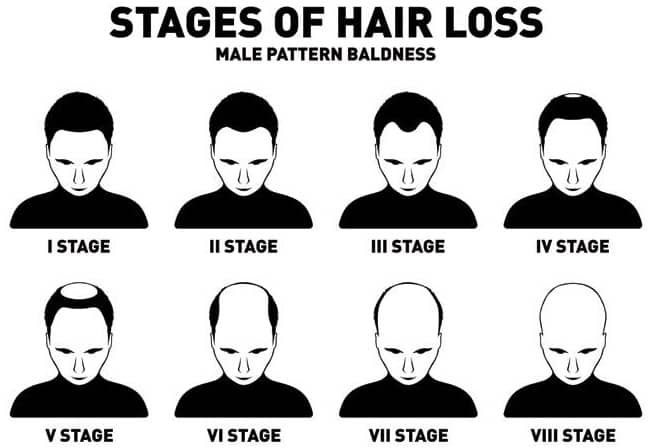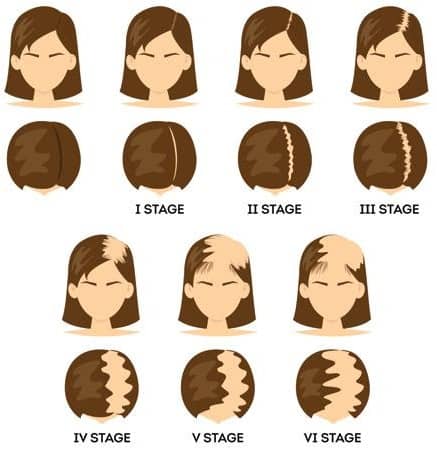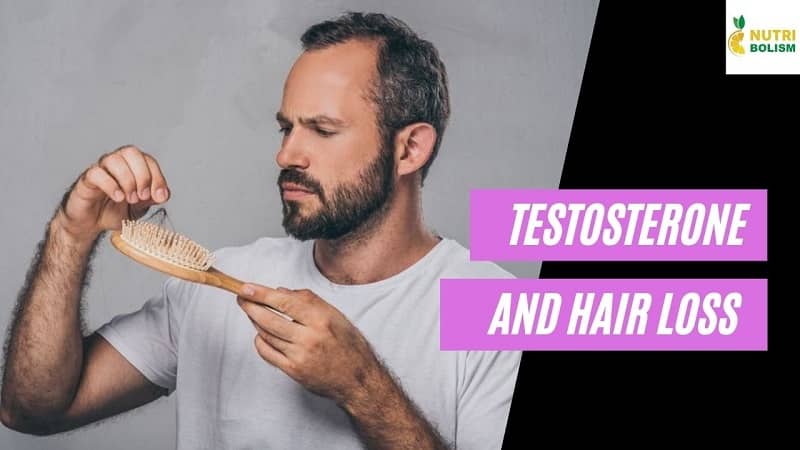Testosterone, the male sex hormone, has a crucial role in overall human health. Recent findings suggest low T-level can trigger irreversible hair loss. Well, with this blog, we aim to find the link between testosterone and hair loss.
Testosterone, the male hormone is present in females also.
The reason is its importance for different health functions. Thus, in both sexes, maintaining a regulated T-level is essential for normal functioning body processes.
However, testosterone and hair loss aren’t directly related. Still, it has certain indirect effects on these issues.
Initial findings indicate toward DHT sensitiveness of hair follicles. In fact, DHT or dihydrotestosterone is produced using the male hormone by a specific enzyme called 5-alpha reductase.
Hence, males and females are likely to face hair loss as a result of low testosterone levels. Nonetheless, a detailed analysis can only establish a link between testosterone and hair loss.
Testosterone and Hair Loss: What’s The Relation?
Table of Contents
The male hormone is responsible for the masculine characteristics developing in puberty. A little amount of T is also present in females for specific body processes.
Studies have shown how low T-level can lead to several health issues. This includes
- strength deprivation,
- insomnia, and
- even depression.
Contrarily, even an extremely high T-level doesn’t serve for good.
This applies even in terms of hair loss. Both low and high T-level harms your hair health. Thus, having an adequate balanced level of T is necessary.
What Type Of Testosterone Causes Hair Loss?
Testosterone is present in the human body in different forms.
Surprisingly, several-research has suggested that high T-levels produce certain hormones leading to hair loss.
The main form of testosterone are:
#1: Free Testosterone
This form of the male hormone doesn’t comply with any protein. In fact, free male hormone is related to testosterone receptors, which are absorbed by cells to continue different body processes.
#2: DHT
Derived from testosterone Dihydrotestosterone is key to hair health. In fact, DHT is produced by enzyme 5-alpha reductase and DHEA (present more in females).
Mostly, the hormone is present in the hair, skin, and prostate. So, you can see where the hair health hinders. Actually, DHT attaches with hair follicles making them smaller, leading to hair thinning.
Besides, the last outcomes are hair loss. Besides, the hormone is responsible for the development of masculine characteristics.
High Testosterone vs Low Testosterone
Hair loss can occur due to several reasons. However, one of the evident reason is excess or even inadequacy of the male hormone.
As mentioned, the DHT form of testosterone tends to accumulate on the hair follicle. In normal quantity, this is safe, whereas excess consistency halts the flow of proteins and essential results.
Firstly, these effects of testosterone make hair thinner due to the lack of nutrients. Moreover, it also makes your hair thin and it begins breaking from the mid-section.
In long term, it disturbs the hair regrowth cycle. The resting period of the regrowth cycle expands and even the new hair grows thinner.
It ends up creating bald patches and permanent hair loss. This condition is specifically referred to as DHT testosterone hair loss. In fact, DHT testosterone hair fall occurs in females too.
Though, Testosterone And Hair Loss In Females and males have different patterns. It is still the worst experience.
#1: Male Pattern Baldness

Male pattern baldness (MPB) has a unique shape. Firstly, the front hairline disappears creating an M shape called frontal baldness.
Eventually, this leads to crown baldness creating a U shape. In some cases, MPB spread to chest hair. In fact, hair present in different body parts responds differently to hormonal changes.
Contrarily, facial hair grows in response to the hormonal changes whereas other recedes and leads to baldness.
#2: Female Pattern Baldness

In females, the balding pattern is quite different from males. Generally, it initiates from the part line. However, there may or may not results in complete balding.
Usually, the female balding pattern influences women with PCOS. Also, elderly women specifically the age of 40-50 years post-menopause experiences it
Can Low Testosterone Level Cause Hair Loss?
Testosterone and hair fall have a link, so does low testosterone and hair loss.
Generally, it influences in form of male hair loss or thinning. Also, facial and body hair loss is possible.
The reason is simple any hormonal change in the human body directly or indirectly affects the hair growth cycle.
So, with a drop of T-level, hair growth is affected ultimately, this results in baldness in the front and crown area in men.
Some experts suggest testosterone booster as an effective treatment.
Undoubtedly, it quickly treats the deficiency of testosterone. However, in some situations, regular intake of T-boosters appears to be addictive.
In fact, an unverified or untested T-booster can lead to miserable side effects including hair loss.
So, Can Low Testosterone Cause Hair Loss In Males and females? Yes, it can. Surprisingly, even the higher testosterone level hasn’t had any promising effects.
High Testosterone and Hair Loss: What Are The Odds?
Even an excessive amount of the male hormone isn’t favorable for your hair health.
The science is simple.
With more testosterone, an enzyme will create more DHT. Eventually, they will accumulate on hair follicles making them thinner and weaker.
Lastly, all of this leads to excessive hair fall ending up in bald patches.
While you would observe receding hairline on your head, on the other hand, your body hair would grow rapidly.
You are like to see more hairs on the chest, stomach, and armpit. Moreover, inflammation in this condition leads to itchiness.
The male and female baldness patterns are the ultimate response to the excessive T. Comparatively, male hair loss is denser in the crown region and on the temple specifically.
In contrast, in female baldness patterns, the crown area is highly affected whereas the front hairline remains intact.
Is Testosterone Hair Loss Reversible?
Well, whether the hair loss began with low T-level or high T-level, it is most reversible. Before going for any treatment, being sure about the symptoms are necessary.
In other words, you need to make sure it’s testosterone hair loss.
The problem hasn’t arisen due to some other health issues. Certainly, a trichologist can help you better understand by a thorough examination of your scalp.
How To Treat Hair Loss Caused By Testosterone?
Testosterone hair loss is complex. When not treated properly, it can lead to permanent hair loss.
Thus, a working and effective long-term treatment is favorable. Moreover, the treatment varies with the intensity and condition of hair loss caused by testosterone.
Testosterone and Hair Growth are connected as Low Testosterone and Hair Loss are. So, the first job of treatment is to stabilize T-level. Afterward, the doctor begins the hair regrowth treatment.
Generally, experts employ the combo of the two treatments to effectively reverse testosterone hair loss.
Here are some of the popular testosterone-hair loss therapies!
#1: PRP Treatment
Once testosterone hair-loss prevention treatment completes, Hair regrowth can begin with PRP. Well, PRP means platelet-rich plasma. In fact, it is regarded for its non-invasive, safe, and effective approach.
Platelets are obtained from the patient. Next by employing centrifugal process, which transfers the blood into protein-rich plasma. This has specific hair growth benefits and has excellent tissue healing properties.
In this testosterone hair-loss treatment, plasma is injected at the bald patches to provide hair regrowth. Having the least side effects and amazing results, it is the most effective cure available currently.
Moreover, people often know it as Testosterone Injections Hair Loss Treatment.
#2: DHT Blockers
The treatment works when DHT is a reason behind testosterone hair loss. In such a situation, a DHT blocker instantly breaks its creation in the body.
Well, by use of the medicine that inhibits DHT producing enzyme, the baldness stops. Besides, other treatments include serums, gels, and shampoos.
These help in clearing DHT from your scalp. Once DHT is out of your upper layer, hair experts apply a hair regrowth treatment.
#3: Hair Transplant
For visible hair loss, hair transplant is the most effective testosterone hair fall reversible treatment.
Usually, the process involves extracting hair follicle from the donor area and transplanting it on the bald patches. The donor part is mainly the side or the back of the scalp.
The two most common hair transplant procedures are:
- Strip harvesting
- FUE (Follicular Unit Extraction)
#4: Scalp Reduction
For extreme hair loss, scalp reduction is another strong approach. Actually, it’s a surgical process requiring the removal of bald patches present on your scalp
Afterward, the nearest healthy hair growth part of the scalp is stretched. This is positioned accordingly for better hair regrowth.
The final outcome is drastically amazing. The bald patches are lesser and hair loss reduces. However, the only con of the scalp reduction method is the scars left after the surgical methods complete.
#5: Other Methods
Besides, numerous treatments for testosterone hair fall are available. After a detailed inspection of the scalp and previous medical history by dermatologists, one can know the effective methods available. In several cases, low or even high zinc can lead to hair loss.
Certainly, higher zinc presence increases testosterone production. Eventually, greater T-level triggers hair loss. However, employing the right medicine can prevent hair loss.
Moreover, other available treatments are ketoconazole for treating fungal infection working as a DHT blocker. Plus, a biotin treatment not only nourishes scalps while promoting hair regrowth.
Testosterone and Hair Loss | FAQ’s
We’ve discussed almost everything related to hair loss triggered. Nonetheless, some common questions are still left. Here, we’ve answered them.
Q1: Is Testosterone The Reason I Am Balding?
Testosterone can be the reason behind balding. However, it is the reason always. Oftentimes excess testosterone in your bloodstream leads to hair loss and hair damage.
Mostly male patients suffering from hair loss experience so because of testosterone imbalance. Nonetheless, only a medical examination can explain the real cause.
Q2: Does Testosterone Cause Hair Growth?
When testosterone is the reason behind hair loss, the male hormone might help. Thus, asking does Testosterone helps hair growth somehow is justified.
However, more of the male hormone not only increases your scalp hair but the body and facial hair also. Thus, only a specialist can help you receive results as per your requirements.
Q3: What Causes DHT To Increase?
The main culprit behind testosterone hair loss is DHT. The excess amount of DHT leads to intense hair loss.
Well, the production of DHT begins with testosterone. So, the more male hormone, the more DHT, and more will be the hair loss.
Q4: Can Testosterone Cause Hair Loss?
In several cases, high T-levels and even low testosterone levels lead to hair loss.
DHT is produced from testosterone by using several enzymes, which tend to accumulate on the hair follicles. When your body has more T, the more will be DHT and the more DHT will clog the hair follicle.
Evidently, when an excess of DHT accumulates on the hair follicle, it prevents nutrient flow and nourishment. Ultimately, your hair becomes thin leading to hair loss.
Q5: Does Hair Grow Back After Stopping Testosterone?
That’s an argumentative topic to discuss. Usually, testosterone used in hair treatment is the top preference when the cause of hair loss is testosterone itself.
The specialist either recommends testosterone boosting or reducing medicine as per the cause of hair loss (which can be either of the two).
Most people think that stopping testosterone boosters might hinder the hair fall caused by low T-level. However, it can happen or it won’t happen.
The science is simple: hair loss begins due to hormone imbalance.
Thus, when you stop taking T-supplement and can maintain your hormone level, you won’t be worried about hair growth. In contrast, if the hormone imbalance occurs again it can help.
Lastly, we’ve shared a summed up overview…
Final Words
The current lifestyle has led to various health problems. Undoubtedly, testosterone hair fall is one of the most common ones specifically in men.
The balding pattern can be different from man to man. Nevertheless, effective treatments are available to treat hair loss caused by the male hormone.
You can even try A Testosterone Booster That Doesn’t Cause Hair Loss.
Don’t believe in any Testosterone Baldness Myth floating on the internet. And become an expert and go on the way to such treatment. First consulting with a specialist is necessary.
They can examine and provide the real reason behind this problem. Certainly, testosterone isn’t the only reason behind hair loss.
Diet is the key to optimum health. So, plan your diet accordingly for hair health.
